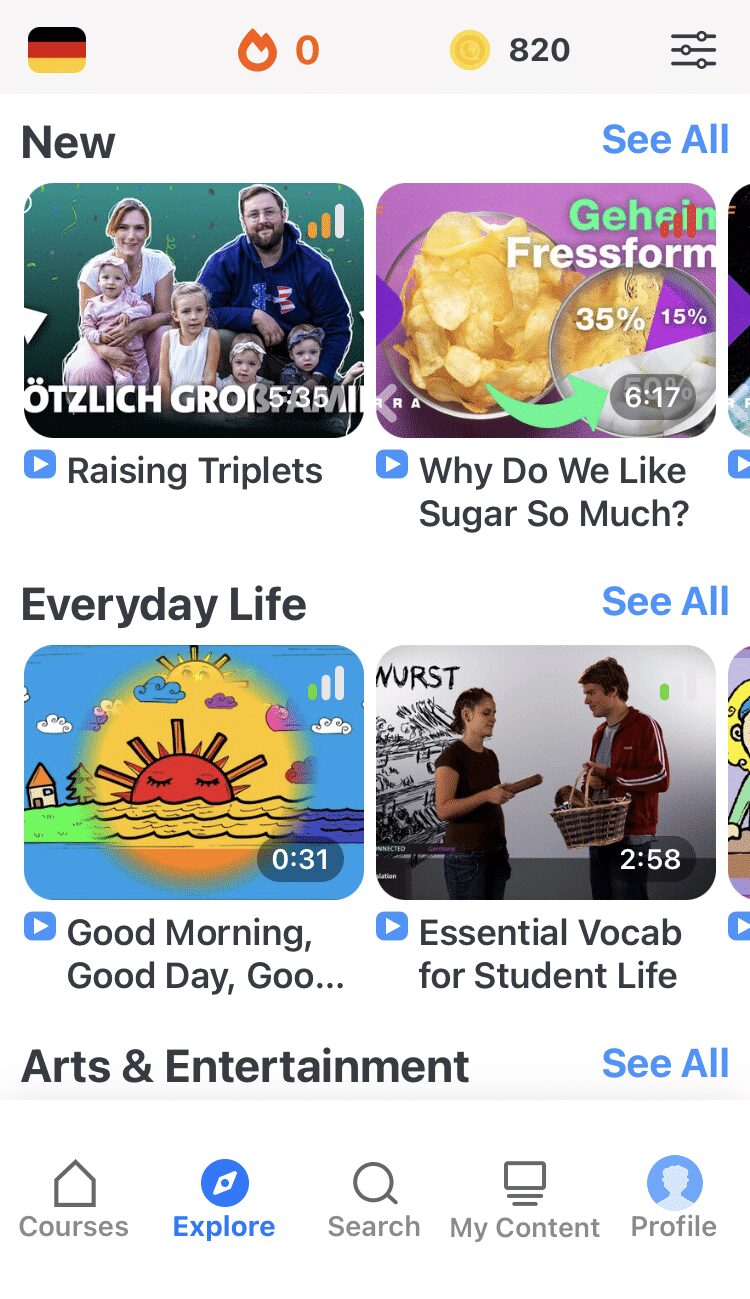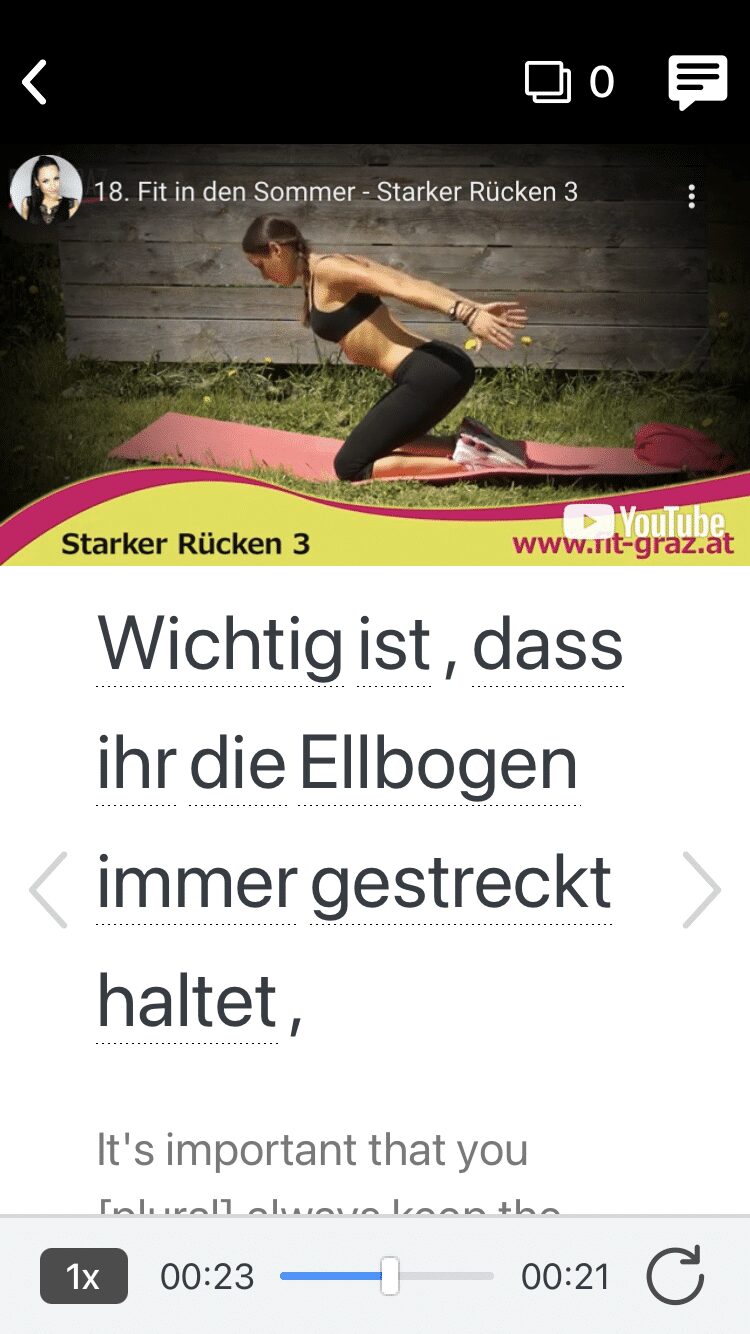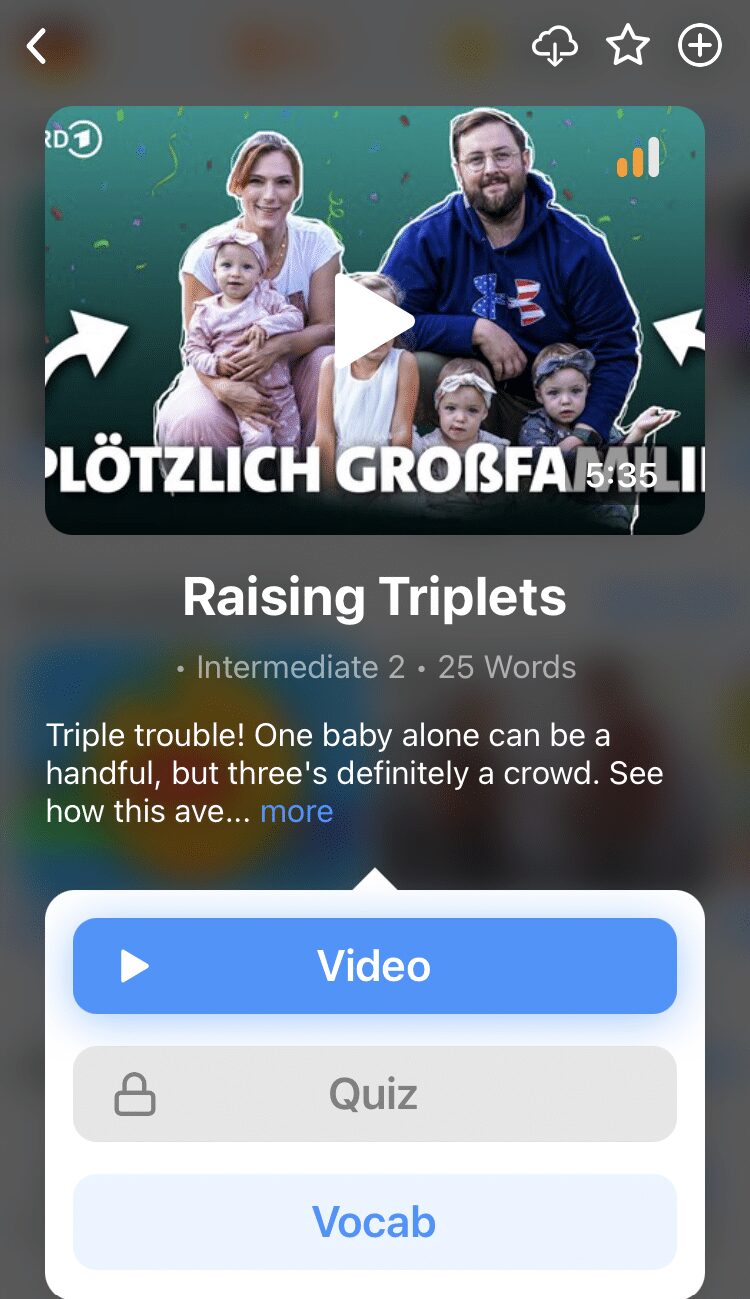189 Common German Words

There are hundreds of thousands (potentially millions) of German words hanging around, just waiting to be learned and used. But as a newcomer to German vocabulary, you’ll need to prioritize certain ones.
I’ve chosen 189 German words based on frequency and usefulness. Learn these, and you’ll be much better off in your next German conversation.
Download: This blog post is available as a convenient and portable PDF that you can take anywhere. Click here to get a copy. (Download)
Common German Nouns
German nouns are gendered and paired with the appropriate pronoun: der is the masculine pronoun, die is feminine, das is neuter and die is also used for plural nouns.
Let’s go over some of the critical ones you should know.
1. der Mann — man
2. die Frau — woman
3. das Kind — child
4. der Junge — boy
5. das Mädchen — girl
6. der Freund — friend
7. die Leute — people (plural)
8. die Familie — family
9. die Arbeit — work
10. die Stadt — city
11. das Ding — thing
12. das Beispiel — example
13. die Frage — question
14. das Problem — problem
15. das Leben — life
16. das Geld — money
17. das Essen — food
18. das Haus — house
German Prepositions
German prepositions take different cases. Some can take on more than one, with a rule of thumb being that the dative is used for stasis or location and the accusative used for describing movement or a change of state.
Be aware that using the wrong case can imply a different meaning!
19. von — by, of, from (dative)
20. um — about, around, at (accusative)
21. zu — to, towards (dative)
22. bis — until, by, up to (accusative)
23. an — to, on (accusative or dative)
24. auf — on, to, upon (accusative or dative)
25. aus — from, out of (dative)
26. bei — by, at, near, in (dative)
27. seit — since, for (dative)
28. für — for (accusative)
29. vor — before, in front of (dative)
30. nach — after, towards (dative)
31. in — in (accusative or dative)
32. durch — through (accusative)
33. mit — with (dative)
34. neben — beside, near (dative)
German Pronouns
German pronouns can be a little tricky for learners because they change depending on the case and, at times, gender. We’ll go over the pronouns in their nominative, accusative and dative forms (in that order).
36. du / dich / dir — you (informal, singular)
37. er / ihn / ihm — he / him / it (for masculine nouns)
38. sie / sie / ihr — she / her / it (for feminine nouns)
39. es / es / ihm — it (for neuter nouns)
41. ihr / euch / euch — you (informal, plural)
42. sie / sie / ihnen — they / them
43. Sie / Sie / Ihnen — you (formal, singular and plural)
Common German Phrases
Few conversations would feel complete without the bare essentials of phrases. These are the basic German phrases and expressions that you’re bound to use in any chat you have, no matter how long or short.
44. Hallo — Hello
45. Guten Morgen — Good morning
46. Guten Abend — Good afternoon
47. Gute Nacht — Good night
48. Ich heiße… — My name is…
49. Wie geht’s? — How are you? (informal)
50. Auf Wiedersehen — Goodbye / See you again
51. Tschüss — Bye
52. Gesundheit — Bless you
53. Ja — Yes
54. Nein — No
55. Vielleicht — Maybe / Perhaps
56. Bitte — Please / You’re welcome
57. Entschuldigung — Excuse me
58. Danke — Thanks
59. Es tut mir leid — I’m sorry
60. Genau — Exactly / That’s right
61. Ach so — I see
To get to know more everyday phrases in German, you can watch the videos on FluentU.
FluentU takes authentic videos—like music videos, movie trailers, news and inspiring talks—and turns them into personalized language learning lessons.
You can try FluentU for free for 2 weeks. Check out the website or download the iOS app or Android app.
P.S. Click here to take advantage of our current sale! (Expires at the end of this month.)
German Verbs
Off to do something? Hopefully you know how to say so in German. Here are some common German verbs that will get you going.
62. sein — to be
63. haben — to have
64. machen — to make, do
65. gehen — to go
66. nehmen — to take
67. bringen — to bring
68. werden — to become
69. wollen — to want
70. wissen — to know (information)
71. kennen — to know (a person or place)
72. können — can, to be able to
73. mögen — to like
74. denken — to think
German Adjectives
Luckily, many adjectives in German sound quite similar to their English counterparts. Just don’t forget that in German, adjectives are also conjugated when paired with nouns.
75. gut — good
76. schlecht — bad
77. klein — small
78. groß — big, tall
79. schön — handsome, beautiful, lovely, nice
80. fantastisch — fantastic
81. traurig
— sad
82. müde — tired
83. neu — new
84. alt — old
85. jung — young
86. kalt — cold
87. heiß — hot
88. kurz — short
89. lang — long
90. viel
— a lot / very
91. wenig — a little
German Body Parts
Knowing how to describe the body parts in German is essential for beginner learners. Here are some of the crucial body parts you should know right away.
92. der Körper — body
93. der Kopf — head
94. das Gesicht — face
95. die Augen — eyes
96. die Nase — nose
97. der Mund — mouth
98. der Hals — neck
99. die Schulter — shoulder
100. die Brust — chest / breast
101. der Rücken — back
102. der Bauch — stomach
103. der Arm — arm
104. die Hand — hand
105. das Bein — leg
106. der Fuß — foot
German Numbers
Counting in German is pretty simple, but you’ll of course have to get familiar with the numbers first. No worries—they should be pretty quick to memorize!
107. null — zero
108. eins — one
109. zwei — two
110. drei — three
111. vier — four
112. fünf — five
113. sechs — six
114. sieben — seven
115. acht — eight
116. neun — nine
117. zehn — ten
118. elf — eleven
119. zwölf — twelve
120. dreizehn — thirteen
121. vierzehn — fourteen
122. fünfzehn — fifteen
123. sechzehn — sixteen
124. siebzehn — seventeen
125. achtzehn — eighteen
126. neunzehn — nineteen
127. zwanzig — twenty
128. dreißig — thirty
129. vierzig — forty
130. fünfzig — fifty
131. sechzig — sixty
132. siebzig — seventy
133. achtzig — eighty
134. neunzig — ninety
135. hundert — one hundred
136. tausend — one thousand
German Time and Seasons
Words associated with time in German and the time of year are also one of the first things on the beginner learner’s agenda. So make sure to start learning these!
137. die Zeit — time
138. früh — early
139. spät — late
140. die Uhr — clock / o’clock (pronoun removed)
141. die Stunde — hour
142. die Minute — minute
143. der Tag — day
144. die Woche — week
145. der Monat — month
146. das Jahr — year
147. der Winter — winter
148. der Frühling — spring
149. der Herbst — fall
150. der Sommer — summer
Common Multi-Purpose Words and Phrases
The words in this section are multi-purpose words that you’ll hear often, with definitions broad enough to apply in a variety of contexts—it’s handy to have these guys around.
151. Stimmt — agreed / right / true
It is often used to affirm a comment someone else has made.
152. Stimmt das? — Is that right?
153. Das stimmt nicht — That’s not right
154. Stimmt so! — Keep the change (handy in restaurants/cafes if you’re feeling generous)
155. Genau — exactly
It serves as something of a filler or sentence connector when you’ve paused between statements, similar to the way you use “so” in English.
156. Genau hier — Right here
157. Genau wie — Exactly like
158. Also — well/so
159. Also! Fangen wir an? — Well, shall we get started? (Expression of enthusiasm)
160. Also…ich weiß es nicht — Well…I don’t know. (Expression of uncertainty)
161. Äh — the German version of “um”
162. Oder — or / right / isn’t it?
Questions and Responses
163. Einen schönen Abend / Tag noch — a lovely evening/day still
This phrase is used for polite leave-taking, usually between strangers or acquaintances. It is basically the equivalent of “have a nice day.”
164. Schönes Wochenende — have a nice weekend
165. Gleichfalls! — likewise / same to you
You can say this in reply to a polite leave-taking phrase such as the above. It’s the appropriate catch-all response to all manner of well wishing.
166. Wie, bitte? — pardon?
The polite way of asking someone to repeat themselves, if you haven’t heard or understood.
167. Was geht? — what’s up? / what’s going on?
This is how you’d informally say “what’s up?” or “what’s going on?” to a friend.
168. Was ist los? — What’s wrong?
169. Hast du was (etwas)? — Is something wrong?
170. Warum? —Why?
171. Echt? — Really?
172. Geil! — Cool!
173. Ach, so! — Aha!
It’s also a good idea to brush up on your Umgangsprache (slang) here.
English Imports
It’s reassuring to know that you’re going to regularly come across many German words that you recognize. A growing number of German words are direct imports from English.
Take these verbs:
174. skypen — Skype
175. downloaden — to download
176. checken — to check
177. chatten — to chat
178. bloggen — to blog
These have all been effectively adapted from English to the German grammatical structure. As you can see, many come from relatively recent developments in digital technology. But you’ll also find:
179. surfen — to surf (on the net as well as at the beach)
180. joggen — to jog
181. pushen — to push
182. flirten — to flirt
183. babysitten — to babysit
184. smalltalken — to small talk
And, increasingly:
185. sorry — sorry (is it really surprising when Entschuldigung is such a mouthful?)
Finally, here’s a fairly exhaustive list of English loanwords in German.
Fun Expressions
You’ll need to have a giggle from time to time. Lucky for you, German has plenty of amusing yet functional words to offer. Here’s a few that might make you smile.
186. Quatsch — rubbish
For example:
Das ist Quatsch (that’s rubbish) or quatschen (to talk rubbish)
187. Blöd — stupid
188. Lust — passion or inclination
If someone asks you if you have Lust auf Schockolade, they’re not prompting you to expose your burning desire for the stuff, but rather whether you feel like eating it.
Similarly, ich habe keine Lust darauf simply means “I don’t feel like it.”
189. Jein — yes and no
It’s used to express a divided opinion.
189 words sounds like a lot, but remember, these are just the tip of the German language iceberg! Our complete guide on how to learn German vocabulary is here.
Once you’re confident with the essentials, you can plow forward and indulge in all the other fun and quirky words unique to German!
Download: This blog post is available as a convenient and portable PDF that you can take anywhere. Click here to get a copy. (Download)
And One More Thing...
Want to know the key to learning German effectively?
It's using the right content and tools, like FluentU has to offer! Browse hundreds of videos, take endless quizzes and master the German language faster than you've ever imagine!
Watching a fun video, but having trouble understanding it? FluentU brings native videos within reach with interactive subtitles.
You can tap on any word to look it up instantly. Every definition has examples that have been written to help you understand how the word is used. If you see an interesting word you don't know, you can add it to a vocabulary list.
And FluentU isn't just for watching videos. It's a complete platform for learning. It's designed to effectively teach you all the vocabulary from any video. Swipe left or right to see more examples of the word you're on.
The best part is that FluentU keeps track of the vocabulary that you're learning, and gives you extra practice with difficult words. It'll even remind you when it’s time to review what you’ve learned.
Start using the FluentU website on your computer or tablet or, better yet, download the FluentU app from the iTunes or Google Play store. Click here to take advantage of our current sale! (Expires at the end of this month.)












